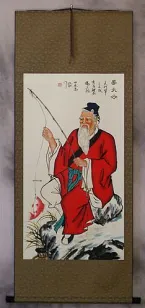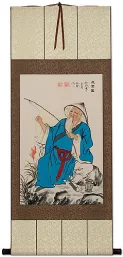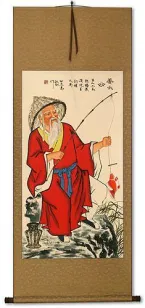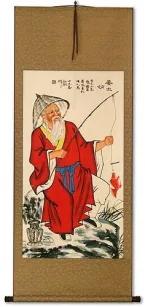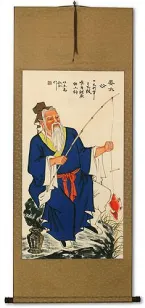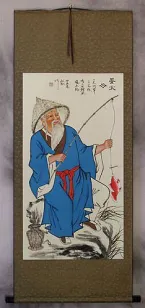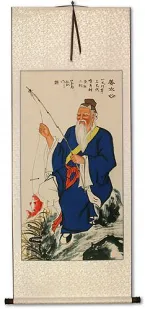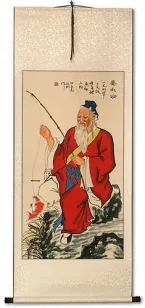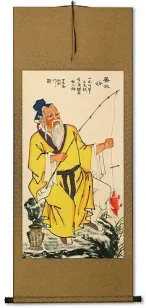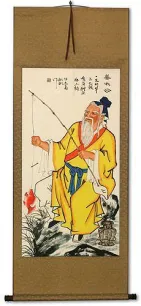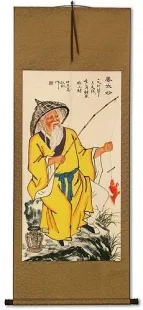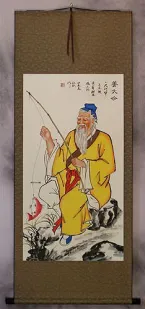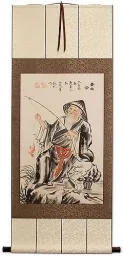Many custom options...
And formats...

Old Man in Chinese / Japanese...
Sorry! There's currently no match for Old Man in the calligraphy database...
If you want a special phrase, word, title, or proverb, feel free to contact me, and I'll translate your custom calligraphy idea for you.
Below are some entries from our dictionary that may match your old man search...
| Characters If shown, 2nd row is Simp. Chinese |
Pronunciation Romanization |
Simple Dictionary Definition |
燕 see styles |
yàn yan4 yen tsubame(p); tsubakurame(ok); tsubakura(ok); tsubakuro(ok); tsubame(p) つばめ(P); つばくらめ(ok); つばくら(ok); つばくろ(ok); ツバメ(P) |
More info & calligraphy: Swallow(1) (kana only) swallow (bird of the Hirundinidae family); martin; (2) barn swallow (Hirundo rustica); (3) (See 若い燕) younger man involved with an older woman; boy toy; (given name) Yasushi |
祖父 see styles |
zǔ fù zu3 fu4 tsu fu sofu(p); jiji; jii; ooji; oji; sobu(ok) / sofu(p); jiji; ji; ooji; oji; sobu(ok) そふ(P); じじ; じい; おおじ; おじ; そぶ(ok) |
More info & calligraphy: Grandfather(1) grandfather; (2) (おおじ only) (See 爺・1) old man; (3) (おおじ only) kyogen mask used for the role of an old man; (place-name) Sofu grandfather |
聖人 圣人 see styles |
shèng rén sheng4 ren2 sheng jen seijin / sejin せいじん |
More info & calligraphy: Holy Man / Saint(1) {Christn} saint; (2) (orig. meaning) wise and virtuous person (esp. in Confucianism); great religious teacher; sage; (3) (See 清酒) refined sake; (male given name) Masato is the opposite of the 凡人 common, or unenlightened man. |
愚公移山 see styles |
yú gōng yí shān yu2 gong1 yi2 shan1 yü kung i shan |
More info & calligraphy: Where There is a Will, There is a Way |
生老病死 see styles |
shēng lǎo bìng sǐ sheng1 lao3 bing4 si3 sheng lao ping ssu shouroubyoushi / shorobyoshi しょうろうびょうし |
More info & calligraphy: Birth Old-Age Sickness Death(yoji) {Buddh} the four inevitables in human life (birth, aging, sickness, and death) Birth, age, sickness, death, the 四苦 four afflictions that are the lot of every man. The five are the above four and 苦 misery, or suffering. |
叟 see styles |
sǒu sou3 sou sou / so そう |
old gentleman; old man (archaism) (See 翁・おきな・1) old man; venerable gentleman |
士 see styles |
shì shi4 shih shi し |
member of the senior ministerial class (old); scholar (old); bachelor; honorific; soldier; noncommissioned officer; specialist worker (1) man (esp. one who is well-respected); (2) (See 侍・1) samurai; (suffix noun) (3) person (in a certain profession, esp. licensed); member; (personal name) Mamoru A gentleman, scholar, officer. |
尉 see styles |
yù yu4 yü jou / jo じょう |
used in 尉遲|尉迟[Yu4chi2] and 尉犁[Yu4li2] (1) (archaism) (See 判官・はんがん・2) inspector (third highest of the four administrative ranks of the ritsuryō system); (2) {noh} (See 翁・おきな・1) old man; (3) white ash (of charcoal); (surname) I |
末 see styles |
mò mo4 mo matsu まつ |
tip; end; final stage; latter part; inessential detail; powder; dust; opera role of old man (n-suf,n) (1) the end (of); (suffix noun) (2) (See 粉末) powder; (surname, given name) Matsu Branch, twig; end; dust; not; translit, ma, va, ba; cf. 摩. |
枴 拐 see styles |
guǎi guai3 kuai |
cane; walking stick; crutch; old man's staff |
爺 爷 see styles |
yé ye2 yeh jiji; jijii; jii; jijii; jiji / jiji; jiji; ji; jiji; jiji じじ; じじい; じい; ジジイ; ジジ |
grandpa; old gentleman (1) (kana only) (See 祖父・2) old man; (2) (derogatory term) (usu. ジジイ) old geezer |
翁 see styles |
wēng weng1 weng okina(p); ou / okina(p); o おきな(P); おう |
elderly man; father; father-in-law; neck feathers of a bird (old) (1) old man; venerable gentleman; (suffix) (2) (おう only) (honorific or respectful language) venerable; old; father; (surname) On an old man |
耆 see styles |
qí qi2 ch`i chi ki |
man of sixty or seventy Old, 60 years of age, experienced; translit. ji, g. |
丁夫 see styles |
dīng fū ding1 fu1 ting fu |
(in ancient times) a man old enough for corvée or military service |
丈人 see styles |
zhàng rén zhang4 ren2 chang jen joujin / jojin じょうじん |
wife's father (father-in-law); old man (1) (honorific or respectful language) elder; senior; (2) wife's father; father-in-law; (given name) Takehito |
三元 see styles |
sān yuán san1 yuan2 san yüan sangen さんげん |
(old) first place in civil service examinations at three levels: provincial 解元[jie4 yuan2], metropolitan 會元|会元[hui4 yuan2] and palace 狀元|状元[zhuang4 yuan2] (1) (See 上元,中元・1,下元) 15th day of the 1st, 7th and 10th lunar months; (2) heaven, earth and man; (3) January 1; New Year's Day; (can act as adjective) (4) {chem} ternary; (female given name) Miyuki |
上座 see styles |
shàng zuò shang4 zuo4 shang tso kamiza; jouza / kamiza; joza かみざ; じょうざ |
seat of honor (n,vs,adj-no) chief seat; seat of honor; seat of honour; head of the table; (place-name) Jōza Sthavira; or Mahāsthavira. Old man, or elder; head monk, president, or abbot; the first Buddhist fathers; a title of Mahākāśyapa; also of monks of twenty to forty-nine years standing, as 中座 are from ten to nineteen and 下座 under ten. The 釋氏要覽 divides presiding elders into four classes, those presiding over monasteries, over assemblies of monks, over sects, and laymen presiding over feasts to monks. |
中男 see styles |
chuunan / chunan ちゅうなん |
(1) (See 次男・じなん) one's second son; (2) (archaism) (See 少丁) man between 17 and 20 years old (ritsuryō system); (personal name) Nakao |
健者 see styles |
shitatakamono したたかもの |
(1) strong-willed person; old hand; shrewd rascal; wily fox; desperate character; formidable woman; (2) strong man; brave man |
兵児 see styles |
heko へこ |
(Kagoshima dialect) young man (between 15 and 25 years old) |
大将 see styles |
taishou(p); daishou(ok) / taisho(p); daisho(ok) たいしょう(P); だいしょう(ok) |
(1) {mil} general; admiral; (2) head; chief; leader; boss; kingpin; (3) (familiar language) (familiar or jocular term for addressing a male) old chap; mate; boss; chief; man; (4) (See 先鋒・せんぽう・2) athlete who competes in the last match of a team competition (kendo, judo, etc.); (given name) Hiromasa |
夫子 see styles |
fū zǐ fu1 zi3 fu tzu fuushi / fushi ふうし |
Master (old form of address for teachers, scholars); (used sarcastically) pedant (1) (honorific or respectful language) (term of address formerly used in China) teacher; wise man; sage; master; (2) (honorific or respectful language) (See 孔子) Confucius; (3) the person concerned; you; he; she; (female given name) Tsumako |
孤老 see styles |
gū lǎo gu1 lao3 ku lao |
solitary old man or woman; regular patron (at brothels) |
小父 see styles |
oji おじ |
(kana only) (familiar language) (vocative; used with suffix さん or 様) old man; mister |
愚公 see styles |
gukou / guko ぐこう |
(char) Yu Gong (main character in the 4th century BC Chinese fable "The Foolish Old Man Removes the Mountains"); Yúgōng; Yukong; (ch) Yu Gong (main character in the 4th century BC Chinese fable "The Foolish Old Man Removes the Mountains"); Yúgōng; Yukong |
松蘿 see styles |
shoura; saruogase(gikun) / shora; saruogase(gikun) しょうら; さるおがせ(gikun) |
(1) (See サルオガセ) old man's beard (any lichen of genus Usnea); (2) (しょうら only) (archaism) pine tree vines; deep entanglement |
沙彌 沙弥 see styles |
shā mí sha1 mi2 sha mi shami |
novice Buddhist monk śrāmaṇera, 室羅摩拏洛迦; 室末那伊洛迦; 室羅摩尼羅 The male religious novice, who has taken vows to obey the ten commandments. The term is explained by 息惡行慈 one who ceases from evil and does works of mercy, or lives altruistically; 勤策男 a zealous man; 求寂 one who seeks rest; 求涅槃寂 one who seeks the peace of nirvāṇa. Three kinds are recognized according to age, i. e. 7 to 13 years old, old enough to 驅鳥 'drive away crows'; 14 to 19, called 應法 able to respond to or follow the doctrine; 20 to 70. |
狂骨 see styles |
kyoukotsu / kyokotsu きょうこつ |
ghostly skeletal old man who emerges from wells (Japanese folklore) |
狒々 see styles |
hihi ひひ |
(1) (kana only) baboon; (2) (derogatory term) lecher; dirty old man; skirt-chaser |
狒狒 see styles |
fèi fèi fei4 fei4 fei fei hihi ひひ |
baboon (1) (kana only) baboon; (2) (derogatory term) lecher; dirty old man; skirt-chaser |
Click here for more old man results from our dictionary
This in-stock artwork might be what you are looking for, and ships right away...
Gallery Price: $108.00
Your Price: $59.88
Gallery Price: $108.00
Your Price: $59.88
Successful Chinese Character and Japanese Kanji calligraphy searches within the last few hours...
